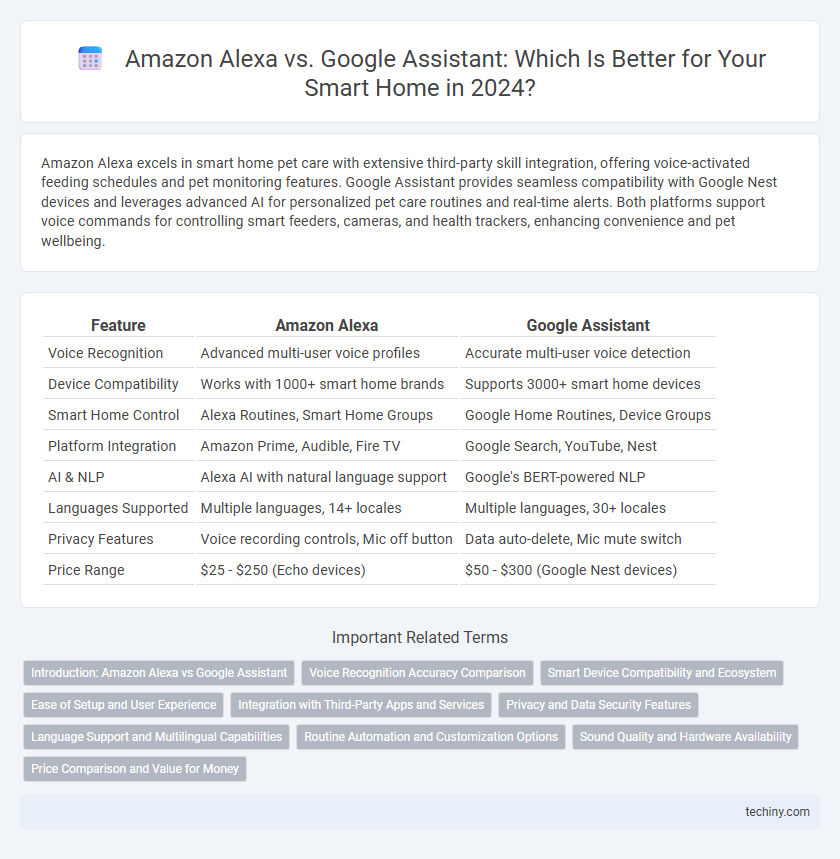Amazon Alexa excels in smart home pet care with extensive third-party skill integration, offering voice-activated feeding schedules and pet monitoring features. Google Assistant provides seamless compatibility with Google Nest devices and leverages advanced AI for personalized pet care routines and real-time alerts. Both platforms support voice commands for controlling smart feeders, cameras, and health trackers, enhancing convenience and pet wellbeing.
Table of Comparison
| Feature | Amazon Alexa | Google Assistant |
|---|---|---|
| Voice Recognition | Advanced multi-user voice profiles | Accurate multi-user voice detection |
| Device Compatibility | Works with 1000+ smart home brands | Supports 3000+ smart home devices |
| Smart Home Control | Alexa Routines, Smart Home Groups | Google Home Routines, Device Groups |
| Platform Integration | Amazon Prime, Audible, Fire TV | Google Search, YouTube, Nest |
| AI & NLP | Alexa AI with natural language support | Google's BERT-powered NLP |
| Languages Supported | Multiple languages, 14+ locales | Multiple languages, 30+ locales |
| Privacy Features | Voice recording controls, Mic off button | Data auto-delete, Mic mute switch |
| Price Range | $25 - $250 (Echo devices) | $50 - $300 (Google Nest devices) |
Introduction: Amazon Alexa vs Google Assistant
Amazon Alexa and Google Assistant are two leading smart home voice assistants, each offering robust features for controlling connected devices, managing daily tasks, and providing personalized information. Alexa excels with its extensive compatibility across thousands of third-party smart home products and wide variety of Alexa Skills, while Google Assistant leverages Google's powerful search engine and natural language processing capabilities for more intuitive voice interactions. Both platforms support routines, multi-room audio, and integration with popular smart home ecosystems, making them central hubs for automation and voice control.
Voice Recognition Accuracy Comparison
Amazon Alexa's voice recognition accuracy excels in understanding diverse accents and noisy environments, leveraging advanced natural language processing algorithms. Google Assistant demonstrates superior contextual comprehension and faster response times due to its integration with Google's expansive search index and AI capabilities. Both platforms continually improve, but Alexa often outperforms in multi-user households while Google Assistant leads in conversational fluidity.
Smart Device Compatibility and Ecosystem
Amazon Alexa supports over 100,000 smart home devices from various brands, offering extensive compatibility across lighting, security, and thermostats. Google Assistant integrates seamlessly with Google Nest products and supports a broad range of third-party devices, emphasizing smart home ecosystems centered around Google's services. Both platforms provide robust device compatibility, but Alexa's wider third-party support contrasts with Google's tighter ecosystem integration.
Ease of Setup and User Experience
Amazon Alexa offers a straightforward setup process through the Alexa app, with seamless integration across a wide range of smart home devices, enhancing user convenience. Google Assistant provides an intuitive setup experience via the Google Home app, optimizing voice commands and personalized routines for efficient home automation. Both platforms prioritize user-friendly interfaces, but Alexa's compatibility often simplifies initial device pairing, while Google Assistant excels in contextual understanding for natural interactions.
Integration with Third-Party Apps and Services
Amazon Alexa supports over 100,000 third-party skills, enabling extensive integration with smart home devices, entertainment systems, and productivity tools. Google Assistant leverages Google's ecosystem and supports thousands of Actions on Google, offering seamless compatibility with services like Google Calendar and YouTube. Both platforms prioritize interoperability, but Alexa's broader skill library provides more diverse options for customized automation and control.
Privacy and Data Security Features
Amazon Alexa and Google Assistant implement robust privacy measures, including voice command encryption and customizable data management settings. Google Assistant offers automatic deletion of voice recordings after three months, while Alexa provides a voice history review and one-touch deletion via the Alexa app. Both platforms incorporate wake word detection designed to limit unintended activation, but variations in data retention policies influence user control over personal information security.
Language Support and Multilingual Capabilities
Amazon Alexa supports over 15 languages and offers multilingual mode that allows users to interact in two languages simultaneously, enhancing usability for bilingual households. Google Assistant excels with support for more than 30 languages and enables seamless switching between languages in a single query, providing a more natural conversational experience. Both assistants continuously expand their language databases, but Google Assistant leads in multilingual flexibility and language diversity for global users.
Routine Automation and Customization Options
Amazon Alexa offers extensive routine automation with customizable triggers such as voice commands, schedules, and sensor detections, enabling tailored smart home experiences. Google Assistant excels in context-aware routines that adapt based on user location and preferences, providing seamless integration across multiple devices. Customization in Alexa leans toward detailed control through the Alexa app, while Google Assistant emphasizes intuitive setup and dynamic adjustments via Google Home.
Sound Quality and Hardware Availability
Amazon Alexa delivers superior sound quality with devices like the Echo Studio offering 3D audio and powerful bass, while Google Assistant's Nest Audio emphasizes clarity and balanced sound. Alexa provides a wider range of hardware options, including smart speakers, displays, and third-party integrations, making it more versatile for diverse smart home setups. Google Assistant's hardware lineup is growing but remains more limited compared to Alexa's extensive ecosystem.
Price Comparison and Value for Money
Amazon Alexa devices generally offer a broader range of budget-friendly options, with models like the Echo Dot priced competitively under $50, while Google Assistant devices such as the Nest Mini start slightly higher but include more integrated Google services. Alexa provides extensive compatibility with third-party smart home gadgets, enhancing its value for money for users seeking diverse device control. Google Assistant excels in natural language processing and seamless integration with Google's ecosystem, making it a strong choice for users prioritizing efficient voice commands and smart home automation.
Amazon Alexa vs Google Assistant Infographic

 techiny.com
techiny.com